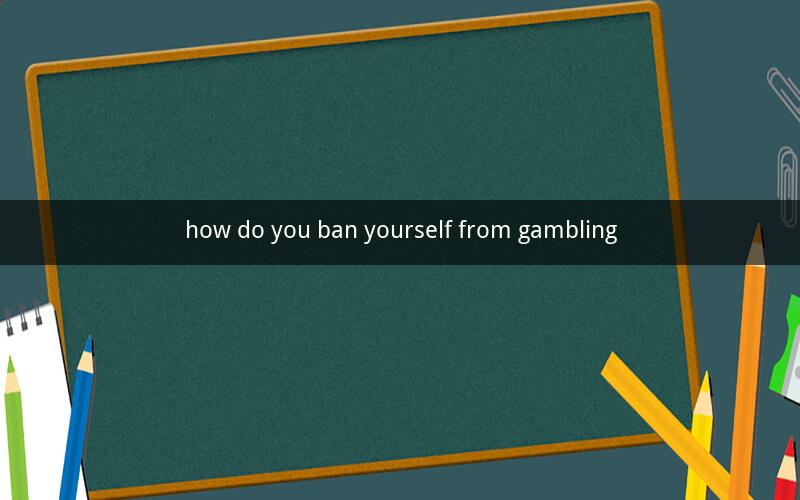
Table of Contents
1. Introduction to Problem Gambling
2. Understanding the Psychological Aspects
3. Strategies to Ban Yourself from Gambling
4. Utilizing Technology to Overcome Temptation
5. Support Systems and Professional Help
6. Legal Measures to Prevent Gambling
7. The Importance of Self-Reflection
8. Case Studies and Success Stories
9. Conclusion
1. Introduction to Problem Gambling
Problem gambling, also known as gambling disorder, is a serious condition that affects individuals of all ages, backgrounds, and socioeconomic status. It is characterized by an inability to control or stop gambling, despite negative consequences. In this article, we will explore various methods on how to ban yourself from gambling.
2. Understanding the Psychological Aspects
To effectively ban yourself from gambling, it is crucial to understand the psychological aspects that contribute to this behavior. These include the thrill of taking risks, the desire to win, and the emotional relief that comes from engaging in gambling activities. By addressing these underlying factors, you can develop a stronger resolve to overcome your addiction.
3. Strategies to Ban Yourself from Gambling
a. Set Clear Boundaries: Establish strict rules for yourself, such as limiting the amount of money you can spend on gambling and the frequency of your visits to casinos or online platforms.
b. Remove Temptations: Eliminate access to gambling sites, delete gambling apps from your devices, and avoid socializing with individuals who encourage or engage in gambling.
c. Develop Alternative Activities: Find healthy and fulfilling activities to replace gambling, such as exercising, hobbies, or spending time with loved ones.
d. Identify Triggers: Recognize the situations, emotions, or thoughts that trigger your gambling urge and develop coping mechanisms to deal with them.
4. Utilizing Technology to Overcome Temptation
Technology can be both a friend and foe when it comes to overcoming gambling addiction. Use the following tools to help you stay on track:
a. GamBlock: This software blocks access to gambling websites and can be installed on your computer or mobile device.
b. Self-Exclusion Programs: Many casinos and online platforms offer self-exclusion programs that prevent you from accessing their services for a specified period.
c. Tracking Apps: Use apps that track your spending and help you monitor your gambling habits.
5. Support Systems and Professional Help
Seeking support from friends, family, or support groups can provide you with the encouragement and guidance needed to overcome your addiction. Additionally, consider seeking professional help from a therapist specializing in gambling addiction.
6. Legal Measures to Prevent Gambling
In some cases, legal measures may be necessary to prevent you from gambling. This could include obtaining a court order to restrict your access to gambling sites or attending a treatment program as part of a probation or parole agreement.
7. The Importance of Self-Reflection
Regular self-reflection can help you gain insight into your gambling behavior and identify areas for improvement. Consider asking yourself the following questions:
a. Why do I gamble?
b. What are the consequences of my gambling?
c. How can I change my behavior?
8. Case Studies and Success Stories
Many individuals have successfully banned themselves from gambling. Reading their stories can provide inspiration and motivation to overcome your addiction. Here are a few examples:
a. John, a former gambler, joined a support group and developed a strong support network, which helped him overcome his addiction.
b. Sarah, who had lost her home and career due to gambling, sought professional help and developed a comprehensive plan to change her behavior.
c. Michael, a recovering gambler, used GamBlock software to block access to gambling sites and replaced his gambling habit with exercise and social activities.
9. Conclusion
Banning yourself from gambling requires dedication, discipline, and a strong support system. By understanding the psychological aspects of problem gambling, utilizing technology, seeking professional help, and reflecting on your behavior, you can take the necessary steps to overcome your addiction. Remember, it is never too late to turn your life around and start anew.
Questions and Answers
1. What are the psychological aspects that contribute to problem gambling?
- The psychological aspects include the thrill of taking risks, the desire to win, and the emotional relief that comes from engaging in gambling activities.
2. How can technology help in overcoming gambling addiction?
- Technology can help by blocking access to gambling sites, tracking spending habits, and providing self-exclusion programs.
3. What are some strategies to ban yourself from gambling?
- Set clear boundaries, remove temptations, develop alternative activities, and identify triggers.
4. What is the role of support systems in overcoming gambling addiction?
- Support systems provide encouragement, guidance, and a sense of community, which can help individuals stay motivated and on track.
5. How can legal measures prevent gambling?
- Legal measures include obtaining court orders to restrict access to gambling sites or attending treatment programs as part of a probation or parole agreement.
6. Why is self-reflection important in overcoming gambling addiction?
- Self-reflection helps individuals gain insight into their behavior, identify areas for improvement, and develop strategies to change their habits.
7. Can someone overcome gambling addiction on their own?
- While it is possible to overcome gambling addiction on your own, seeking support from friends, family, and professionals can significantly increase your chances of success.
8. What are some common triggers for gambling urges?
- Common triggers include stress, boredom, financial problems, and social situations involving gambling.
9. How long does it take to overcome gambling addiction?
- The duration of recovery varies for each individual, but it is a lifelong process that requires ongoing commitment and dedication.
10. What can I do if I think I have a gambling addiction?
- If you suspect you have a gambling addiction, seek help from a professional therapist, join a support group, and develop a plan to change your behavior.